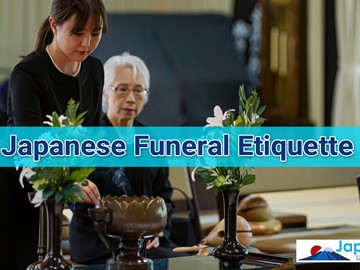Japanese Wedding Etiquette: 7 Steps from RSVP to Afterparty
Attending a wedding ceremony in Japan? Learn everything you need to know to enjoy the big day with this simple 7-step guide to Japanese wedding etiquette.

Attending a wedding ceremony in Japan? Learn everything you need to know to enjoy the big day with this simple 7-step guide to Japanese wedding etiquette.
Number of accesses : 67

From holding chopsticks correctly to avoiding cultural taboos, get a grip on Japanese chopstick etiquette with these 8 essential tips. Vocabulary included!
Number of accesses : 55

BOOKOFF is the most famous second-hand shop in Japan and they have about 800 shops in Japan. In this article, you will learn how to sell items at BOOKOFF in Japan.
Number of accesses : 54

Embrace the cultural shift of moving to Japan by understanding its practices and traditions so that you can thrive in this new and fascinating environment.
Number of accesses : 50

What exactly is the Japanese lucky cat (maneki neko) for? Learn the origin and significance of the colors, gestures, and trinkets it holds, and how it brings good luck and prosperity to businesses and homes.
Number of accesses : 46

Nearly all Japanese funerals (Ososhiki) regardless of religion are conducted Buddhist-style. From dressing to etiquette here is everything you need to know about Japanese funerals.
Number of accesses : 45

Discover the reasons behind Japan's impressive dedication to cleanliness and tidying up, from its history, cultural significance, and social impact in this in-depth article.
Number of accesses : 35

Learn about the significance of tatami mats in Japanese culture, as well as how to size, clean, and maintain tatami flooring.
Number of accesses : 25

In Japan, everyone uses a personal name stamp called "hanko" or "inkan" instead of a written signature like in most other countries. There are mainly three types of seals that are used in various situations. Here's an easy-to-understand guide to the world of Japanese seals complete with instructions on how to make, register, and use your own hanko.
Number of accesses : 23

Getting married in Japan is an important decision. Although foreign citizens need to submit some additional documentation, the whole process is rather straightforward. Our guide will go over the basic requirements as well as the necessary documents for marriage registration in Japan.
Number of accesses : 22

Learn what makes Japanese Imabari towels special—from softness to absorbency. This article covers their features, how to identify authentic ones, care instructions, and why they’re ideal as gifts.
Number of accesses : 21

Navigating Japan’s recyclable garbage system can be more than a little confusing. In this article, we explain what Japan's recycling symbols mean.
Number of accesses : 21

There are many easy ways to donate or sell your used items in Japan. We cover donating used clothing and furniture, selling used items online, and recycle shops.
Number of accesses : 20

Tokyo and Osaka are often compared but what are the differences? Here are some of the differences in culture, dialects, escalator etiquette and more.
Number of accesses : 19

Tokyo’s history began as the small village of Edo founded by the Edo clan in the late 12th century. Discover how it grew through the Edo Period, Meiji Era, and modern times to become Japan’s largest city with over 14 million people.
Number of accesses : 12

Japanese restaurant etiquette can vary greatly from the customs of your home country. Here are some essential points to watch out for to ensure that you enjoy the best meal possible while avoiding any serious mistakes.
Number of accesses : 11

Removing your shoes indoors is a deeply rooted custom of Japanese culture. Find out why and when you need to take off your shoes in Japan.
Number of accesses : 11

Japan is one of the most desirable countries for an eat-and-walk experience, but it’s important to know the rules and etiquette before dining in a park or on the go.
Number of accesses : 9

Japanese word "Mottainai" has more various meanings. It's a great Japanese word that captures the traditional Japanese spirit of respecting and making the most of things and one's abilities. In this article, you can find the meanings of the word, example phrases, and the Mottainai spirit.
Number of accesses : 7

This article explains about Ninja's secret to turning a strong mindset into action, goshinhou, meditation, divine protection and self-care. You can also learn the meaning of the Chinese character "忍”.
Number of accesses : 7

From holding chopsticks correctly to avoiding cultural taboos, get a grip on Japanese chopstick etiquette with these 8 essential tips. Vocabulary included!
Number of accesses : 195

What exactly is the Japanese lucky cat (maneki neko) for? Learn the origin and significance of the colors, gestures, and trinkets it holds, and how it brings good luck and prosperity to businesses and homes.
Number of accesses : 185

Discover the reasons behind Japan's impressive dedication to cleanliness and tidying up, from its history, cultural significance, and social impact in this in-depth article.
Number of accesses : 162

Nearly all Japanese funerals (Ososhiki) regardless of religion are conducted Buddhist-style. From dressing to etiquette here is everything you need to know about Japanese funerals.
Number of accesses : 152

In Japan, everyone uses a personal name stamp called "hanko" or "inkan" instead of a written signature like in most other countries. There are mainly three types of seals that are used in various situations. Here's an easy-to-understand guide to the world of Japanese seals complete with instructions on how to make, register, and use your own hanko.
Number of accesses : 142

Embrace the cultural shift of moving to Japan by understanding its practices and traditions so that you can thrive in this new and fascinating environment.
Number of accesses : 142

BOOKOFF is the most famous second-hand shop in Japan and they have about 800 shops in Japan. In this article, you will learn how to sell items at BOOKOFF in Japan.
Number of accesses : 137

Tokyo’s history began as the small village of Edo founded by the Edo clan in the late 12th century. Discover how it grew through the Edo Period, Meiji Era, and modern times to become Japan’s largest city with over 14 million people.
Number of accesses : 127

Getting married in Japan is an important decision. Although foreign citizens need to submit some additional documentation, the whole process is rather straightforward. Our guide will go over the basic requirements as well as the necessary documents for marriage registration in Japan.
Number of accesses : 119

Attending a wedding ceremony in Japan? Learn everything you need to know to enjoy the big day with this simple 7-step guide to Japanese wedding etiquette.
Number of accesses : 103

Navigating Japan’s recyclable garbage system can be more than a little confusing. In this article, we explain what Japan's recycling symbols mean.
Number of accesses : 98

Learn what makes Japanese Imabari towels special—from softness to absorbency. This article covers their features, how to identify authentic ones, care instructions, and why they’re ideal as gifts.
Number of accesses : 87

Learn about the significance of tatami mats in Japanese culture, as well as how to size, clean, and maintain tatami flooring.
Number of accesses : 75

There are many easy ways to donate or sell your used items in Japan. We cover donating used clothing and furniture, selling used items online, and recycle shops.
Number of accesses : 73

Japanese restaurant etiquette can vary greatly from the customs of your home country. Here are some essential points to watch out for to ensure that you enjoy the best meal possible while avoiding any serious mistakes.
Number of accesses : 59

Tokyo and Osaka are often compared but what are the differences? Here are some of the differences in culture, dialects, escalator etiquette and more.
Number of accesses : 52

Japan is one of the most desirable countries for an eat-and-walk experience, but it’s important to know the rules and etiquette before dining in a park or on the go.
Number of accesses : 50

Removing your shoes indoors is a deeply rooted custom of Japanese culture. Find out why and when you need to take off your shoes in Japan.
Number of accesses : 48

There are many symbols for people with disabilities in Japan. Some of the symbols are universal and you may have seen them abroad. Various symbols and signs relating to people with disabilities indicate that facilities, initiatives, and rules exist for people with disabilities, or inform people with disabilities that they need assistance.
Number of accesses : 31

Japanese word "Mottainai" has more various meanings. It's a great Japanese word that captures the traditional Japanese spirit of respecting and making the most of things and one's abilities. In this article, you can find the meanings of the word, example phrases, and the Mottainai spirit.
Number of accesses : 29

From holding chopsticks correctly to avoiding cultural taboos, get a grip on Japanese chopstick etiquette with these 8 essential tips. Vocabulary included!
Number of accesses : 880

In Japan, everyone uses a personal name stamp called "hanko" or "inkan" instead of a written signature like in most other countries. There are mainly three types of seals that are used in various situations. Here's an easy-to-understand guide to the world of Japanese seals complete with instructions on how to make, register, and use your own hanko.
Number of accesses : 760

Nearly all Japanese funerals (Ososhiki) regardless of religion are conducted Buddhist-style. From dressing to etiquette here is everything you need to know about Japanese funerals.
Number of accesses : 715

What exactly is the Japanese lucky cat (maneki neko) for? Learn the origin and significance of the colors, gestures, and trinkets it holds, and how it brings good luck and prosperity to businesses and homes.
Number of accesses : 557

Embrace the cultural shift of moving to Japan by understanding its practices and traditions so that you can thrive in this new and fascinating environment.
Number of accesses : 528

Navigating Japan’s recyclable garbage system can be more than a little confusing. In this article, we explain what Japan's recycling symbols mean.
Number of accesses : 494

Discover the reasons behind Japan's impressive dedication to cleanliness and tidying up, from its history, cultural significance, and social impact in this in-depth article.
Number of accesses : 461

BOOKOFF is the most famous second-hand shop in Japan and they have about 800 shops in Japan. In this article, you will learn how to sell items at BOOKOFF in Japan.
Number of accesses : 431

There are many easy ways to donate or sell your used items in Japan. We cover donating used clothing and furniture, selling used items online, and recycle shops.
Number of accesses : 388

Getting married in Japan is an important decision. Although foreign citizens need to submit some additional documentation, the whole process is rather straightforward. Our guide will go over the basic requirements as well as the necessary documents for marriage registration in Japan.
Number of accesses : 361

Tokyo’s history began as the small village of Edo founded by the Edo clan in the late 12th century. Discover how it grew through the Edo Period, Meiji Era, and modern times to become Japan’s largest city with over 14 million people.
Number of accesses : 322

Learn what makes Japanese Imabari towels special—from softness to absorbency. This article covers their features, how to identify authentic ones, care instructions, and why they’re ideal as gifts.
Number of accesses : 315

Japan is one of the most desirable countries for an eat-and-walk experience, but it’s important to know the rules and etiquette before dining in a park or on the go.
Number of accesses : 289

Removing your shoes indoors is a deeply rooted custom of Japanese culture. Find out why and when you need to take off your shoes in Japan.
Number of accesses : 276

Learn about the significance of tatami mats in Japanese culture, as well as how to size, clean, and maintain tatami flooring.
Number of accesses : 256

Japanese restaurant etiquette can vary greatly from the customs of your home country. Here are some essential points to watch out for to ensure that you enjoy the best meal possible while avoiding any serious mistakes.
Number of accesses : 244

Tokyo and Osaka are often compared but what are the differences? Here are some of the differences in culture, dialects, escalator etiquette and more.
Number of accesses : 153

Japanese word "Mottainai" has more various meanings. It's a great Japanese word that captures the traditional Japanese spirit of respecting and making the most of things and one's abilities. In this article, you can find the meanings of the word, example phrases, and the Mottainai spirit.
Number of accesses : 151

Make money by selling your used and unwanted stuff on Mercari Japan! This guide shows you how easy it is to set up an account and post products for sale.
Number of accesses : 142

There are many symbols for people with disabilities in Japan. Some of the symbols are universal and you may have seen them abroad. Various symbols and signs relating to people with disabilities indicate that facilities, initiatives, and rules exist for people with disabilities, or inform people with disabilities that they need assistance.
Number of accesses : 130
© 2025 Japan Living Guide. All Rights Reserved.